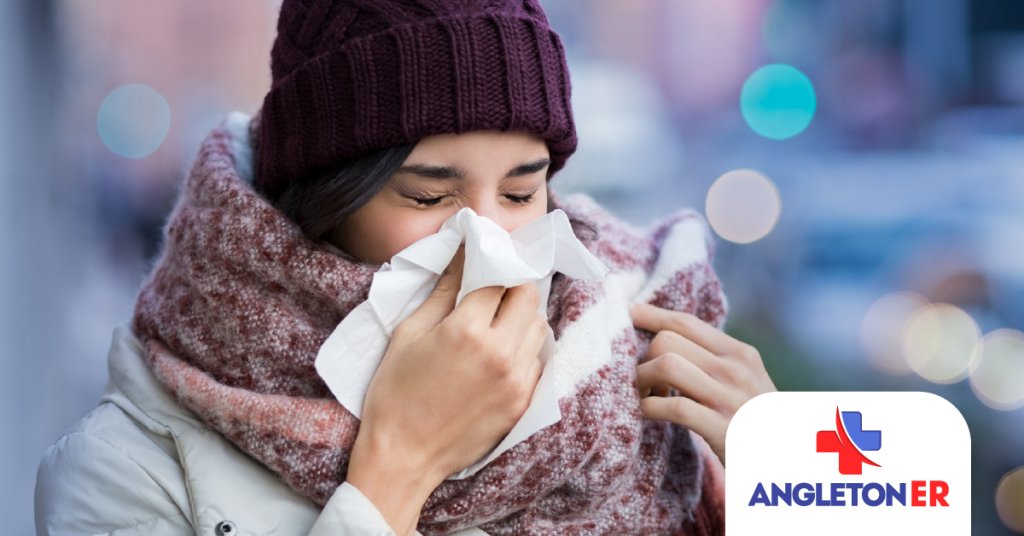Recognizing and Managing Seasonal Allergies in Winter
As winter sets in, many of us retreat indoors to escape the cold. While we may associate allergies with the spring and fall, it’s essential to recognize that seasonal allergies can persist throughout the year.
Nearly 1 in 3 U.S. adults and more than 1 in 4 U.S. children report having a seasonal allergy. Furthermore, according to the Allergies and Asthma Foundation of America (AAFA), allergies are the sixth leading cause of chronic illness in the United States, making it a common concern.
At Angleton ER, the finest emergency room in Angleton, Texas, we’re happy to provide you with the emergency care that you need during those crucial hours.
Winter Allergies – Not Just an Outdoor Affair
Contrary to popular belief, winter allergies are less likely to be caused by outdoor triggers like pollen. Instead, exposure to allergens inside your home or office often triggers them.
In winter, as cold weather forces us indoors, our windows are closed, and our homes are built tighter for better insulation. While this is energy-efficient, it can lead to increased exposure to indoor allergens, causing allergy symptoms to flare up.
Common Winter Allergens
Pet Dander: Even if you keep your pets indoors, their dander can trigger allergies. Pets groom, scratch, and move around, releasing dander that embeds itself in furniture, bedding, and carpets.
Dust: Dust is ubiquitous and contains various allergens, such as skin flakes, hair, and insect parts. Carpets, furniture, window treatments, and bedding are common dust catchers.
Dust Mites: These microscopic creatures thrive in bedding, furniture, and carpets, feeding on skin cells, insect parts, and animal dander.
Mold: Mold can thrive in dark, moist places, like bathrooms, basements, and under sinks, and is a typical winter allergy trigger.
Winter Allergy Symptoms
The symptoms of winter allergies are familiar to those who experience seasonal allergies throughout the year.
These may include:
- Watery and itchy eyes
- Nasal congestion
- Runny or stuffy nose
- Sneezing
- Coughing
- Skin-related symptoms like rashes or dry, itchy skin
Differentiating Winter Allergies from Colds
Since colds and flu are prevalent in winter, distinguishing between winter allergies and a common cold can be challenging.
A key differentiator is the duration of symptoms. Allergies persist as long as the allergen is present, while colds typically last several days to a week.
If your symptoms persist beyond the 10-day mark, it is likely allergies.
Managing Winter Allergies
Taking proactive steps to manage winter allergies can significantly reduce symptoms. Here are some practical tips:
- Keep your home clean: Regularly dust and vacuum, including under and behind furniture.
- Reduce dust-catching fabrics: Opt for hard floors instead of carpets and minimize the use of decorative pillows or throws.
- Use hypoallergenic covers: Cover mattresses and pillows to reduce exposure to dust mites.
- Wash your fabrics and pets regularly: Clean curtains, bedding, and pillows in hot water often, and groom your pets frequently.
- Control humidity: Use a humidifier or dehumidifier as needed to avoid extremes and reduce mold growth.
- Air purifiers: Consider purchasing air purifiers and cleaning your HVAC filters periodically to keep indoor air clean.
When to Seek Emergency Care
While managing allergies is important, knowing when to seek emergency care is crucial.
If breathing is compromised, or there are signs of swelling, especially in the face or tongue, seek immediate medical attention.
Gastrointestinal symptoms, such as vomiting or diarrhea and a rash, may indicate a severe allergic reaction requiring emergency care.
Remember, if symptoms escalate, seeking prompt and specialized care is crucial. Angleton ER is your best option for fast, personalized care, open 24/7 with specialized ER doctors and nurses ready to care for your entire family.
At Angleton ER, we believe everyone should have access to quality medical emergency care near them in a comfortable and convenient location that offers advanced technology and skilled medical professionals.
Looking for the best quality 24-hour Emergency Room services?
Get back on track to enjoying life, FAST! Here you will find experienced, effective and caring emergency physicians as well as the best on-site ER technology for everything from minor to major injuries and conditions.
- CT Scan, Digital X-Ray & Ultrasound
- Certified Full-Service Diagnostic Laboratory
- Specialized Pediatrics ER Care Facilities


